AI Help…Less

If you don’t have kids or don’t go out to dinner much, you probably don’t realize that kids are using smartphones earlier and earlier.
Want to escape those “if looks could kill” stares from the rest of us? Give them the youngsters a phone with an entertaining game or show playing.
Our mature teens don’t watch much TV, but they watch a lot of TV shows on their devices.
But when they search for something, researchers report they expect the content to be there in six seconds or they’re … gone!
If I pass my wife while she’s looking for something it’s, “I’ve been at this for two hours and can’t find it!”
O.K., it’s only been 10 minutes.
But when viewers click away in frustration; the search engines, social media sites and Amazon lose an opportunity to sell you something.
No wonder they’ve been working hard to perfect AI (Augmented Intelligence) technology.
The longer they can keep you involved with them the more they can learn about you, your likes/dislikes; and the more focused ads/products will be, so they’ll make more money.
It’s why Netflix, Hulu, Amazon, Disney (next year) as well as other streaming services and content developers/distributors are doing such a much better job for you.
They gather, study and intelligently recommend content you’re probably going to like; and with each click, they get better.
More importantly, they use all of your inputs/data to develop more than a gut feeling on how well a script is going to be received–even before the EP (executive producer) is hired.
If both groups were able to use facial recognition to follow your actions/reactions, they could do an even better job for you.
Until that gets added to the next generation of smart home devices — Alexa, Google Home, HomePad (on hold) and other personal assistants; they will get better at not just understanding requests but interpreting what the tone, inflection and emotions of the voice requests really mean.
It’ll be as natural as Tom Cruise walking into the store in Minority Report and the wall volunteering to help him make a selection based on his last visit.
And the hell of it is, people are perfectly happy with/don’t even question the intelligent recommendations.
They brag about their advanced technology in their home, demonstrate it and encourage others to join the crowd.
Can’t wait for Zuck to invite us over to show us how well his AI system controls his home … when it’s finished.
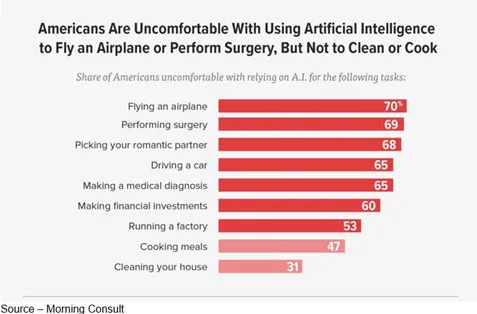
Folks increasingly don’t want to do it, just have it done.
And it’s cool!
Seriously:
- Alexa make sure the door is locked
- Alexa who’s at the door
- Alexa start my car
- Alexa find me something to watch tonight
When people had cable, they would have to physically click through 500 – 1000 channels to find the show they wanted to watch on their device and then they had to go through that exercise again in an hour.
With OTT (over the top), it’s worse.
You not only have Netflix, Amazon Prime, Hulu, Vimeo, CBS online, BBC, India Direct and Sky; but also YouTube, Facebook, Instagram and others to search through to find something to view.
No wonder you’re tired before you relax.
Letting someone, something make the selection for you is an easy solution!
Of course, both data miners and companies find the increasing use of AI beneficial.
They are able to more predictively offer purchase suggestions and advertising based on a person’s past experiences and activities.
Amazon and others with online storefronts keep people in groups of like-mannered shoppers based on past searches/purchases.
Google serves up information, product ideas and ads based on past searches.
Facebook provides information and suggestions based on like-minded people.
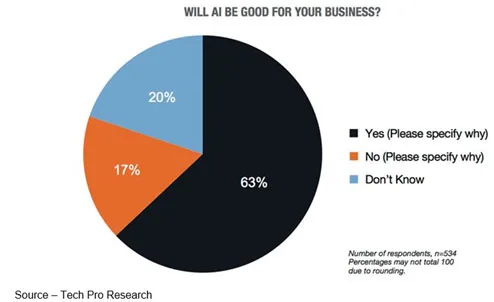
In other words, it’s good for business!
The car shares the owner’s/driver’s behavior patterns with automakers and insurance companies for better navigation, automated driving and lower insurance rates.
At home; socioeconomic profile, life patterns, cognitive and viewing preferences enable people to have richer, more customized entertainment.
Home video monitoring, security systems, thermostats and other smart home tools make certain they understand and serve people better. Of course, they also feed information to the big pools of data to ensure folks deliver more focused product/service offerings and ads.
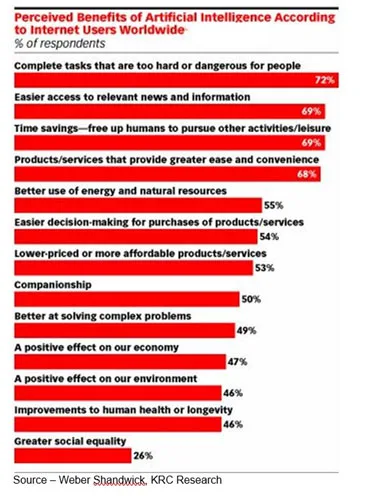
AI just helps people make all those life-changing decisions they have to make every day – what to do, with who, where to go, what to buy, what to read, what to watch.
Imagine you’ll never waste time or money again!
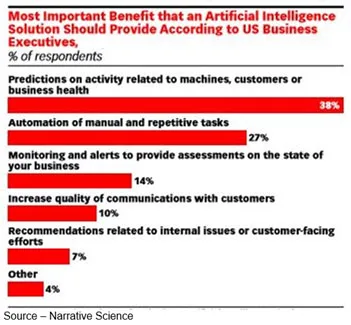
For a business, AI is even more valuable because companies:
- Never invest in the design of a wrong product
- Always deliver the right ads/messages to a consumer who wants/needs their product
- Makes all the right moves for all the right reasons
Just think how valuable AI would have been to Thomas Edison because his teachers said he was too stupid to learn anything.
Cripes, he was so non-productive, he was fired from his first two jobs.
Many folks at the time probably thought he was a failure because he tried to invent the light bulb 1,000 times and was unsuccessful.
Of course, he explained the shortcomings (some say he was rationalizing) by observing that he hadn’t failed but rather found 10,000 ways things won’t work.
He once observed that “The three great essentials to achieve anything worthwhile are; first, hard work; second, stick-to-itiveness; third, common sense.”
I’m not really certain AI has common sense.
AI is much more like the half of Star Trek’s Spock that was Vulcan … logical and wise.
But even Spock was cool to the idea of following technology too closely and said, “Computers make excellent and efficient servants, but I have no wish to serve under them.”
Unfortunately, people will increasingly rely on AI’s suggestions and recommendations because it is convenient and it’s work to weigh/consider different routes.
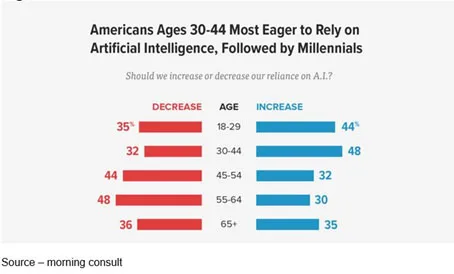
Early and mid-millennials are more eager to embrace AI because it is the easy route.
In addition, we both know it’s darn difficult to say “Hey, I *****ed up. I was wrong!”
The problem is that making mistakes, doing something wrong is the only way we really learn and grow.
Engineers and scientists around the globe were excited when AlphaGo beat the top Go players in the world at the 2500-year-old Chinese board game.

Just as IBM’s DeepBlue beat world champion chess player Garry Kasparov back in 1996, AlphaGo swept the Go board.
Programmers and other techies cheered because it validated that their technology had arrived.
But arrived where?
Even in earlier games, when it was being trained, did it learn anything from each small mismove?
Did it feel disappointment in losing or elation in winning or anything?
By the same token, when people are presented with the right answer, the right path, the right movie to view/book to read, what did they learn?
Nothing!
It was just more convenient to take the solution/recommendation that was presented rather than have to think about it, think it through.
Don’t kid yourself.
People will give up choice for convenience every time.
Sure, it’s not all bad because after all AI already makes decisions/recommendations for us every day based on news items we see/read, online searches we make, ads we may click on (isn’t it weird the way they follow you around?), goods/services we buy, opinions/information we post on Facebook/LinkedIn/Instagram/Twitter, music we listen to and videos we watch.
You “give” them information, AI gives you convenience!
Why gut it out when the solution is delivered on a silver platter?
Tesla’s Elon Musk (and others) have gazed into the future and said AI is like “summoning the devil” and is probably the biggest threat facing the world.
Maybe yes, maybe no; because most people think of a threat as something that confronts and attacks you.
AI won’t do
The generations that haven’t known anything less than instant gratification and instant information will invite it in and allow it to make important choices for them – what they eat, relationships, what they read/view, career path, where they
The challenge won’t be to focus on enhancing and fine tuning the technology to do more for people but to figure out what it means to be human and enhance our soft skills – embracing diversity, being comfortable listening to/reading/watching opposing views, trying and enjoying making mistakes and learning/growing from messing up.
 AI will tell you the same thing Jacq Vaucan said, “You’re supposed to be smarter than me at this stage of the game.”
AI will tell you the same thing Jacq Vaucan said, “You’re supposed to be smarter than me at this stage of the game.”
# # #